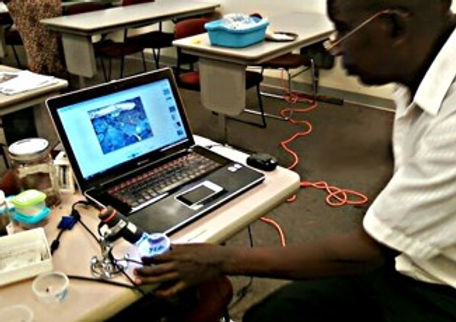top of page

Earth Reporters
.png)
Earth Reporters is a network of educators and ecologists working in promoting place-based citizen science in biodiverse regions of the world. Our partners share our mission of connecting learners wherever they are with their local biodiversity. Online certificate programs engage learners to be community educators, citizen scientists, and ambassadors of our planet. Virtual experiences are supplemented with local community-based experiences and integrated as part of ESL and academic curriculum. Learners who obtain a certificate become an official Earth Reporter in their community.
Who is an Earth Reporter?
-
Earth Reporters are investigators of science.
Earth Reporters think beyond the biology class textbook and are active researchers, environmental guardians, and data collectors in their local communities. Earth Reporters contribute and share data and observations to a collaborative community-based portal and other platforms like iNaturalist. Community-based Data Collection empowers communities to contribute to the knowledge of our planet while promoting awareness of current threats at the local level.
-
Earth Reporters are scientific communicators.
Earth Reporters visit classrooms, create seed libraries, participate in eco-literacy events or develop public outreach campaigns.
-
Earth Reporters promote educational equity and cultural exchange.
Earth Reporters may be involved in developing bilingual educational resources for global classrooms or provide closed captioning that will make science videos accessible to new readers and/or English language learners. Biodiversity resources and materials that are bilingual or multilingual are needed in reaching global classrooms with limited resources.
The Earth Reporter is a classroom reader under development to serve global classrooms and emerging English learners.

Teach to learn.

Learn about our changing planet.
Be an investigative researcher.


Be a citizen scientist.
Integrating citizen science with English language acquisition.
Student Reviews:
"For me it was very interesting to combine science with learning English. For me it helped me to learn language as it applied to science . . . for me it helped to learn about the problems that is happening now with many species with extinction. It is an original and different way of learning. “
Make a global impact.

"Science was like being a detective or investigator. The more I learned the more I wanted to find out.
I remember looking at an insect under a microscope for the first time. . . looking at their face and features.
Would like to spend more time observing
insects under a microscope. . ."

With just English I wouldn’t know or learn about the animals. Now I know how many years and how long ago lived the animals. English and science should be together. . .that would be good.”
-52 year old African refugee from Tanzania

Guatemala partner FLAAR (Foundation for Latin American and Anthropological Research) using bilingual educational resources to teach Guatemala children about native bees.

For more information contact Anne Basham at info@earth-teach.org
bottom of page